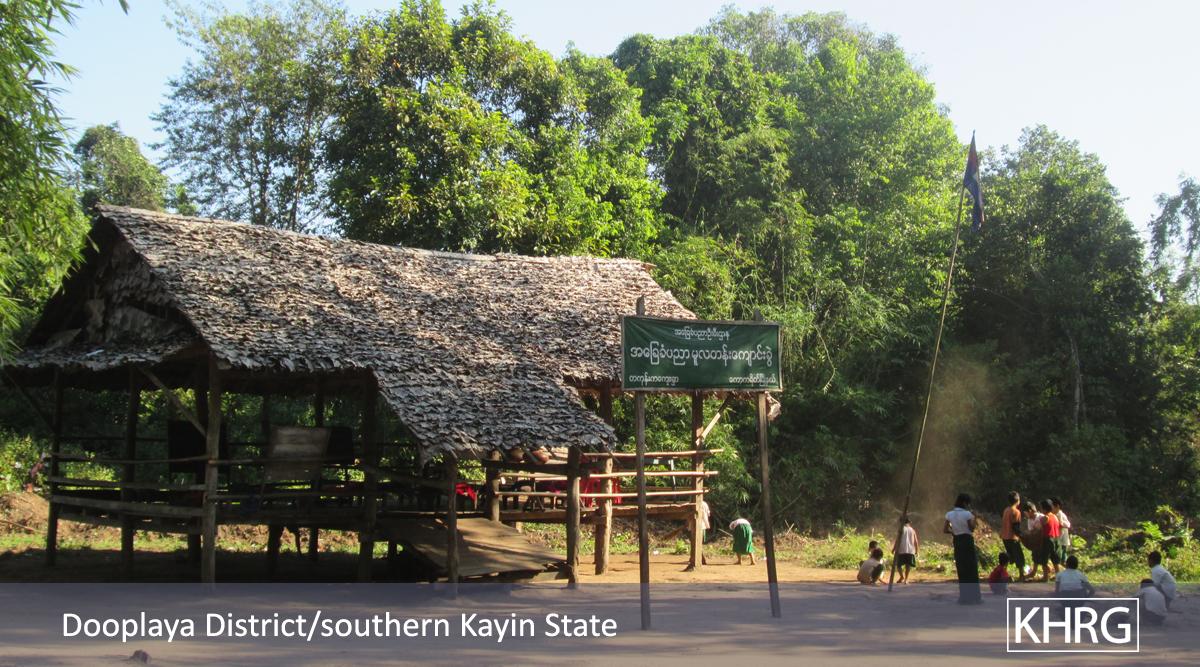This Situation Update describes events occurring in Kyainseikgyi Township, Dooplaya District during the period between June and July 2017. It includes information about a case of land confiscation. The authorities did not provide support to villagers trying to regain their land.
- Villagers reported how the Myanmar government and the Border Guard Force (BGF) collaborated to confiscate and sell lands belonging to local villagers for a palm oil plantation.
- People affected by the land confiscation wrote complaint letters to the KNU township office in order to regain their land. However, they were unsuccessful. Because their land was demarcated by the KNU as a reserved forest, they were unable to obtain land titles.
Situation Update | Kyainseikgyi Township, Dooplaya District (June to July 2017)
The following Situation Update was received by KHRG in July 2017. It was written by a community member in Dooplaya District who has been trained by KHRG to monitor human rights conditions. It is presented below translated exactly as originally written, save for minor edits for clarity and security.[1] This report was received along with other information from Dooplaya District.[2]
Between 2015 and 2016, the Border Guard Force (BGF) leader Hpuh Daw Daw, from Battalion #1023 sold around 800 acres of land from Noh Taw Pla village tract, Kyainseikgyi Township to a local Tatmadaw officer and some companies. According to the villagers, Hpuh Daw Daw’s army camp is based near Kyaikdone Town, Kyainseikgyi Township.
The villagers reported to the KHRG researcher that the BGF leader Hpuh Daw Daw did not consult with them before selling the land. The lands that were sold are designated as a reserved forest by the KNU. They were used by villagers from Dz---, Ea--- and Eb--- villages in Noh Taw Pla village tract. Villagers used the land for their livelihoods. Villagers had plantations on some of the confiscated lands. The lands that were sold by Hpuh Daw Daw are located along the main vehicle road between Kyaikdone and Kyainseikgyi towns.
In 2016, a forestry officer and a land survey officer from Myanmar government went to measure the land with the help of BGF soldiers from Battalion #1023. Villagers were not informed and not aware of this action.
In early 2017, villagers reported the land confiscation case to the KNU’s village tract leaders. However, they could not solve the issue. Therefore, they suggested to the villagers to write a complaint letter to the KNU township office. As a follow-up, the villagers whose lands were confiscated wrote, signed and submitted a complaint letter to the KNU township office. The authorities responded by saying that the villagers could work on their land as per usual. However, they could not help villagers to process the case further. They also stated that the lands are in an area demarcated as a reserved forest by the KNU. Therefore, the KNU could not provide a land title for the local villagers.
On June 4th 2017, the BGF soldiers came to the area and cleared the land to carry out a palm oil plantation project. They planted the BGF’s flag on the land, measured and confiscated it. The villagers did not dare to say anything to the BGF soldiers as they were afraid of them.
Footnotes:
[1] KHRG trains community members in southeast Burma/Myanmar to document individual human rights abuses using a standardised reporting format; conduct interviews with other villagers; and write general updates on the situation in areas with which they are familiar. When writing situation updates, community members are encouraged to summarise recent events, raise issues that they consider to be important, and present their opinions or perspective on abuse and other local dynamics in their area.
[2] In order to increase the transparency of KHRG methodology and more directly communicate the experiences and perspectives of villagers in southeastern Burma/Myanmar, KHRG aims to make all field information received available on the KHRG website once it has been processed and translated, subject only to security considerations. For additional reports categorised by Type, Issue, Location and Year, please see the Related Readings component following each report on KHRG’s website.







